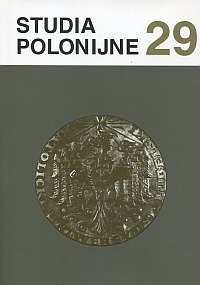„Do You Have a Polish Heart?” Poles in the Life of the Metropolitan Edward Ropp
Main Article Content
Abstract
In the life of the Mohylov Archbishop Edward Ropp (1851-1939) Poles had a special place. Born in a Polish-German family in the part of Poland annexed to Russia, he was brought up in an atmosphere of tolerance and of harmonious cohabitation of many nations in one area. He believed in patriotism ascribed to the country, which consisted in organic cooperation of representatives of various nations aiming at development of their country, or of their little fatherland. The metropolitan admitted he was Polish, he felt a special bond with the Polish nation and he did a lot for Poles living in the East of Europe. When holding various offices in the Church he did not stress his nationality but first of all identified himself with the office. He felt he was a bishop of the Catholic Church, designed for all the nations of the world, without any exceptions. He tried to appease national conflicts between Poles, he supported them in their fight for the right to use their native tongue in church services and at school. He helped the victims of war, Polish prisoners of war, refugees and repatriates to return home. He made attempts to defend the Church property that was composed of gifts and donations made by Poles. He defended the right of Poles in the Soviet Russia, in the Ukraine and in Belarus to a free development of their culture, language and their right to worship God after the Riga treaty of 1921. He saw the Poles’ services to the development of Catholicism in the East, but first of all he stressed the significance of the Catholic Church for the survival of the Polish identity in the Eastern marches in the period of the Partitions of Poland. He believed that after Poland regains independence Poles for geopolitical reasons and because of their historical bonds were entrusted with the mission of promoting Catholicism in Russia. Owing to his kindness, readiness to give any help, justice and courage he was loved and respected by the Polish community in the East.

